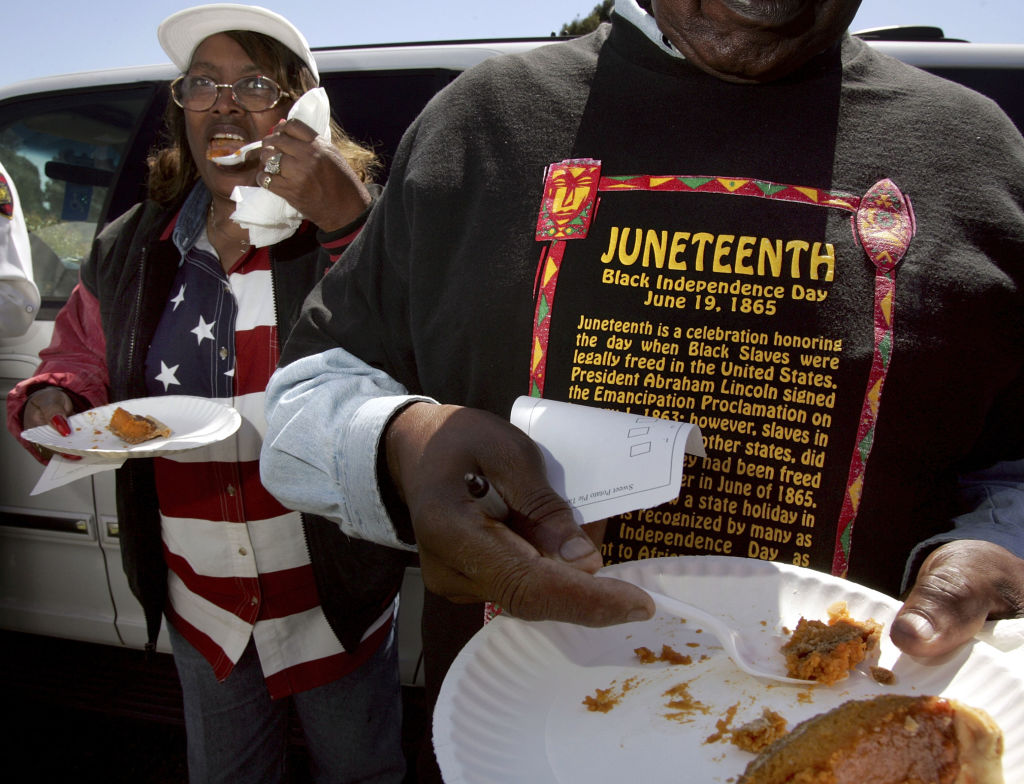Original Juneteenth proclamation found as America's black emancipation holiday goes national


A free daily email with the biggest news stories of the day – and the best features from TheWeek.com
You are now subscribed
Your newsletter sign-up was successful
Juneteenth, a holiday marking the end of slavery in the U.S., has been celebrated by black Americans for generations, typically with cookouts, song, parades, and other festivities. This year, amid a coronavirus pandemic that kills African Americans at three times the rate as whites and coast-to-coast protests against racism and police brutality sparked by the killing of George Floyd, Juneteenth has gone national and multiracial.
Nike, the NFL, Twitter, and several media outlets made Juneteenth a company holiday this year, and on Wednesday, New York declared it a paid holiday for state workers, The Associated Press reports. Hundreds of Juneteenth events are planned around the U.S., including in Tulsa, where President Trump had earlier planned to hold a rally Friday. Every state but Hawaii, North Dakota, and South Dakota officially recognizes Juneteenth, and the White House, as Trump learned Thursday, has been issuing statements celebrating Juneteenth in his name every year he's been in office.
Given the growing public interest in the holiday, the National Archives searched for and, on Thursday, found the original handwritten Juneteenth proclamation, announcing to slaves in Galveston on June 19, 1865, that they had been emancipated in 1863.
The Week
Escape your echo chamber. Get the facts behind the news, plus analysis from multiple perspectives.

Sign up for The Week's Free Newsletters
From our morning news briefing to a weekly Good News Newsletter, get the best of The Week delivered directly to your inbox.
From our morning news briefing to a weekly Good News Newsletter, get the best of The Week delivered directly to your inbox.
"The people of Texas are informed that, in accordance with a proclamation from the Executive of the United States, 'all slaves are free,'" Union Army Maj. F.W. Emery wrote on June 19, on behalf of Maj. Gen. Gordon Granger, who had arrived in Galveston with 2,000 Union soldiers 10 weeks after the Confederacy surrendered. "This involves an absolute equality of personal rights and rights of property between former masters and slaves and the connection heretofore existing between them becomes that between employer and hired labor."
There have been printed version of Granger's "Orders No. 3" for a long time, "but this is something that we haven't tracked down before," Trevor Plante, the archivist who found the document, tells The Washington Post, adding that Emery's handwritten version "absolutely" predated the printed order.
A free daily email with the biggest news stories of the day – and the best features from TheWeek.com
Peter has worked as a news and culture writer and editor at The Week since the site's launch in 2008. He covers politics, world affairs, religion and cultural currents. His journalism career began as a copy editor at a financial newswire and has included editorial positions at The New York Times Magazine, Facts on File, and Oregon State University.
-
 Fine food on a budget
Fine food on a budgetThe Week Recommends Excellent value eateries with the Michelin inspectors’ seal of approval
-
 Where to go for the 2027 total solar eclipse
Where to go for the 2027 total solar eclipseThe Week Recommends Look to the skies in Egypt, Spain and Morocco
-
 The end of mass-market paperbacks
The end of mass-market paperbacksUnder the Radar The diminutive cheap books are phasing out of existence
-
 TikTok secures deal to remain in US
TikTok secures deal to remain in USSpeed Read ByteDance will form a US version of the popular video-sharing platform
-
 Unemployment rate ticks up amid fall job losses
Unemployment rate ticks up amid fall job lossesSpeed Read Data released by the Commerce Department indicates ‘one of the weakest American labor markets in years’
-
 US mints final penny after 232-year run
US mints final penny after 232-year runSpeed Read Production of the one-cent coin has ended
-
 Warner Bros. explores sale amid Paramount bids
Warner Bros. explores sale amid Paramount bidsSpeed Read The media giant, home to HBO and DC Studios, has received interest from multiple buying parties
-
 Gold tops $4K per ounce, signaling financial unease
Gold tops $4K per ounce, signaling financial uneaseSpeed Read Investors are worried about President Donald Trump’s trade war
-
 Electronic Arts to go private in record $55B deal
Electronic Arts to go private in record $55B dealspeed read The video game giant is behind ‘The Sims’ and ‘Madden NFL’
-
 New York court tosses Trump's $500M fraud fine
New York court tosses Trump's $500M fraud fineSpeed Read A divided appeals court threw out a hefty penalty against President Trump for fraudulently inflating his wealth
-
 Trump said to seek government stake in Intel
Trump said to seek government stake in IntelSpeed Read The president and Intel CEO Lip-Bu Tan reportedly discussed the proposal at a recent meeting
